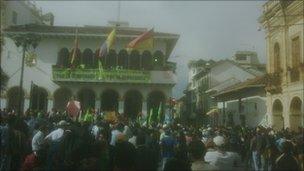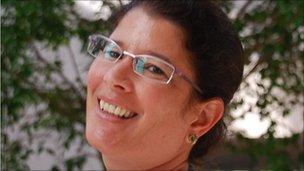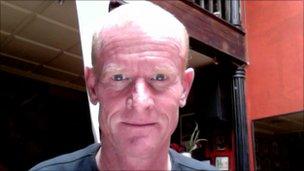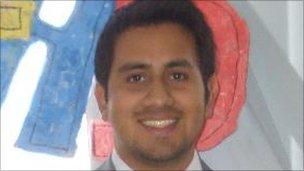Ecuador unrest: Your stories
- Published

Pro-president demonstration in Cuenca
Ecuador's President Rafael Correa has been rescued by soldiers after being holed up at a hospital in the capital following a tear gas attack.
Mr Correa left the clinic after soldiers opened fire on the police, following protests by officers angry at benefit cuts.
Here, BBC News website readers explain what has been happening in their area:
Tracey Tokuhama-Espinosa, Quito

There is no police presence on the streets and people are staying indoors as they don't feel safe outside. Everyone's problem is that we don't know what is happening at the moment.
The government has taken over all of the media networks and is bombarding the public with propaganda and interviews with people who back President Correa. They are not showing any opposing perspective and making those who protest [against] the president appear evil and irrational.
The other problem is that there is no police presence on the streets and people are staying indoors, as they don't feel safe outside. I have a friend who works for a travel agency. She saw that lots of drug users came out and camped in front of her office. She got scared and decided to lock herself in and spend the night in the office.
Nobody wants the government to fail - the police only wanted to have their voice heard, as they were not happy with the law passed. Nobody has the desire to shut down democracy. This country is a one-man show and people don't feel represented.
Chris Breen, Cuenca

I am just one block from the centre of the city square where the demonstrations are currently active.
Contrary to the reports coming in on national television from Quito and Guayaquil, Cuenca, the third largest city, is mainly tranquil.
The main square hosted a pro-Correa demonstration in which about 1,000 people were involved. I have heard from locals that people were attacking shop owners and one person died, but apart from that it seems quite stable.
There were many speeches by the local county officials and songs dedicated to the revolution of Che Guevara were sung.
Now there's hardly anyone on the streets. No-one is about. I have a restaurant and bar and usually by now we'd have people in, but there's nobody here.
We lost all access to the internet for about three hours earlier, which was pretty strange.
We don't know what's going to happen next. I personally don't believe it's a coup attempt. I feel it all seems to be exaggerated.
Gustavo Guerrero, Quito

I have been around the city for the whole day and Quito is completely calm as people are staying in their homes and seeing events unfold on television.
On the street, the prevalent opinion is that the national police has botched its protests and the government is firmly under control. The city is nowhere close to being a disaster zone, there have been a few crimes committed at banks but people are on the streets not fearing for their life.
It is true that Ecuador has a history of being a very volatile country, but as of this moment the president as well as his allies, political enemies and institutions, most importantly the armed forces, stand firmly behind the government.
It is becoming a political theatre and not a constitutional crisis down here. We have to keep our ears open but let's not jump to conclusions. Events on the ground are not as dire as they appear to be.
Hopefully it stays that way, as most Ecuadoreans are now clamouring for stability and a continuation of this government's policies.
More comments from Ecuador
I honestly do not see a coup. It is just that we do not want to be communist. We don't want to be a Cuba number two. The police and army are right. I think that the president went into the police base to challenge them. Francisco, Quito
We were in Guayaquil and saw the fire in Avenida Las Americas and managed to skirt round the area. We then saw a peaceful protest in Ave Francisco Orellana where the government offices are. We had a first-hand report from a civil servant who said the police came in and forced these offices to close. He sounded very shocked. We also witnessed a man pulled from his car by uniformed men (in combats so police or army) and pushed to the ground. We left at 1315 and found no difficulty in leaving the city and no problems coming to the coast. The local shopping mall was closed very early and the streets are very quiet. Nick Mercer, Puerto Lucia
I was meant to fly from Quito this afternoon, but everywhere is a no-go. There's a real sense of threat everywhere even if there is no outright danger to people walking the streets during daylight hours. While we're seeing non-striking metropolitan police on the streets of Quito, there is a fear of what might happen once it gets dark, and tomorrow. So far, there have been no clashes and we have not seen military force on the streets of Quito - yet. Roland Hughes, Quito
Only in Ecuador can you wake up one morning and everything is in order, and by late afternoon the country is in a state of emergency. In a matter of hours schools closed, businesses shut down and everyone went home or to the streets to protest. The tension is definitely thick in the air. Sasha, Quito
The streets of Quito are more congested than usual, and most businesses are closed. There is also an aura of nervousness. However, staying away from the central areas of protest, the city is not particularly dangerous, nor exciting. Peter Koziol, Quito
The whole town is closed. Transport is down, shopping centres shut and schools closed until further notice. There is a lot of emphasis here on staying indoors and little idea on how the events will turn out. Ben Butcher, Quito
- Published1 October 2010